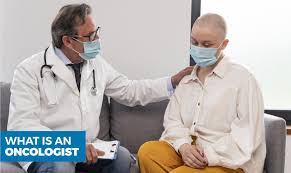Outline:
- Introduction to Oncology
- What is an Oncologist?
- Types of Oncologists
- Medical Oncologist
- Surgical Oncologist
- Radiation Oncologist
- Subspecialties in Oncology
- Pediatric Oncology
- Gynecologic Oncology
- Hematologic Oncology
- Neuro-Oncology
- Educational Path to Becoming an Oncologist
- Undergraduate Education
- Medical School
- Residency and Fellowship
- Common Cancers Treated by Oncologists
- Breast Cancer
- Lung Cancer
- Colorectal Cancer
- Diagnostic Tools in Oncology
- Biopsy
- Imaging (MRI, CT Scans, PET Scans)
- Blood Tests
- Treatment Approaches in Oncology
- Chemotherapy
- Radiation Therapy
- Surgery
- Immunotherapy
- The Role of Clinical Trials in Oncology
- The Importance of a Multidisciplinary Team
- Patient-Centered Care in Oncology
- Emotional and Psychological Support for Cancer Patients
- The Future of Oncology
- Precision Medicine
- Artificial Intelligence in Oncology
- Challenges Faced by Oncologists
- Conclusion
- FAQs
- What’s the difference between an oncologist and a hematologist?
- How long does it take to become an oncologist?
- What questions should I ask my oncologist?
- Do oncologists only treat cancer?
- How often should I see an oncologist if I’m a cancer survivor?
The Role of an Oncologist: Everything You Need to Know
Introduction to Oncology
Cancer is one of the most significant health challenges globally, impacting millions of people every year. With the rise in cancer diagnoses, the role of an oncologist has become more crucial than ever. But what exactly does an oncologist do, and why is their role so vital in the medical world? In this article, we will explore the multifaceted world of oncology, detailing the types of oncologists, their training, the kinds of cancers they treat, and the future of cancer care.
What is an Oncologist?
An oncologist is a physician who specializes in diagnosing, treating, and managing patients with cancer. From the initial diagnosis to treatment and long-term follow-up, oncologists play a pivotal role in the cancer care continuum. The journey of cancer treatment is rarely straightforward, often involving various medical interventions, patient support, and constant adjustments to the treatment plan, making the role of the oncologist both challenging and rewarding.
Types of Oncologists
Oncology is a broad field, and oncologists often specialize in particular areas of cancer treatment. The three primary types of oncologists are:
Medical Oncologist
Medical oncologists are perhaps the most well-known specialists in cancer care. They focus on treating cancer using chemotherapy, hormonal therapies, and targeted therapies. A medical oncologist is usually the primary healthcare provider for cancer patients, coordinating care with other specialists and managing the overall treatment plan.
Surgical Oncologist
Surgical oncologists specialize in removing tumors and cancerous tissues from the body through surgery. They may also perform biopsies to confirm a diagnosis. Surgery is often a crucial step in treating solid tumors, and a surgical oncologist’s expertise is essential in reducing cancer’s impact and improving patient outcomes.
Radiation Oncologist
Radiation oncologists treat cancer using radiation therapy. This type of therapy uses high-energy radiation to destroy cancer cells or shrink tumors. Radiation oncologists work closely with other members of the oncology team to develop and implement a treatment plan that maximizes effectiveness while minimizing side effects.
Subspecialties in Oncology
Beyond these primary roles, oncology also encompasses several subspecialties that address specific types of cancer or patient populations.
Pediatric Oncology
Pediatric oncologists specialize in treating cancers that occur in children, such as leukemia, brain tumors, and neuroblastoma. Childhood cancers often behave differently than adult cancers, requiring specialized knowledge and treatment approaches.
Gynecologic Oncology
Gynecologic oncologists focus on cancers that affect the female reproductive system, including ovarian, cervical, and uterine cancers. These specialists are trained in both surgery and chemotherapy and provide comprehensive care for women with these types of cancer.
Hematologic Oncology
Hematologic oncologists treat cancers of the blood, such as leukemia, lymphoma, and myeloma. These types of cancer are often more systemic, affecting the blood, bone marrow, and lymphatic system, requiring a distinct treatment approach compared to solid tumors.
Neuro-Oncology
Neuro-oncologists focus on cancers of the brain and spinal cord. These cancers are particularly challenging because of the complexity of the central nervous system, and treatment often involves a combination of surgery, radiation, and chemotherapy.
Educational Path to Becoming an Oncologist
The journey to becoming an oncologist is long and rigorous, but it’s necessary given the complexity of cancer treatment.
Undergraduate Education
Aspiring oncologists first need to complete a bachelor’s degree, typically with a focus on pre-medical courses such as biology, chemistry, and physics. This foundational education is crucial for building the knowledge base needed for medical school.
Medical School
After completing their undergraduate degree, future oncologists attend medical school, which typically takes four years. During this time, students learn the fundamentals of medicine, including anatomy, physiology, and pharmacology, and gain clinical experience through rotations in various medical specialties.
Residency and Fellowship
After medical school, doctors must complete a residency in internal medicine or a related field, which typically lasts three years. This is followed by a fellowship in oncology, which can take an additional two to four years, depending on the chosen subspecialty. During this time, oncologists receive intensive training in cancer diagnosis, treatment, and patient care.
Common Cancers Treated by Oncologists
Oncologists treat a wide range of cancers, but some types are more common than others.
Breast Cancer
Breast cancer is one of the most commonly diagnosed cancers worldwide. Oncologists treat breast cancer using a combination of surgery, chemotherapy, radiation therapy, and hormonal treatments, depending on the stage and characteristics of the cancer.
Lung Cancer
Lung cancer is a leading cause of cancer-related deaths globally. Treatment for lung cancer often involves surgery, chemotherapy, and targeted therapies, with the type of treatment depending on whether the cancer is non-small cell or small cell.
Colorectal Cancer
Colorectal cancer affects the colon or rectum and is another common cancer treated by oncologists. Screening methods like colonoscopies have made early detection more common, improving the chances of successful treatment.
Diagnostic Tools in Oncology
Diagnosing cancer accurately is the first step in creating an effective treatment plan. Oncologists use a variety of diagnostic tools to understand the type and extent of cancer.
Biopsy
A biopsy involves removing a small piece of tissue from the body to examine it under a microscope. This is one of the most definitive ways to diagnose cancer, as it provides direct insight into the cellular characteristics of a tumor.
Imaging (MRI, CT Scans, PET Scans)
Imaging techniques such as MRI (Magnetic Resonance Imaging), CT (Computed Tomography) scans, and PET (Positron Emission Tomography) scans allow oncologists to see the location and size of tumors. These tools are crucial for both diagnosing cancer and monitoring its progression.
Blood Tests
Certain types of cancers can be detected or monitored using blood tests. For example, leukemia and lymphoma often cause changes in blood cell counts, which can be picked up through routine testing.
Treatment Approaches in Oncology
Cancer treatment is highly individualized, depending on factors such as the type of cancer, its stage, and the patient’s overall health.
Chemotherapy
Chemotherapy uses drugs to kill fast-growing cancer cells. While it can be highly effective, chemotherapy often comes with significant side effects, as it also affects healthy fast-growing cells.
Radiation Therapy
Radiation therapy uses high-energy rays to target and destroy cancer cells. It’s often used in conjunction with other treatments like surgery or chemotherapy, and advancements in technology have made radiation more precise, reducing damage to surrounding healthy tissue.
Surgery
Surgery to remove a tumor is often one of the first steps in cancer treatment, especially for solid tumors. Surgical oncologists play a vital role in removing cancerous tissues while minimizing the impact on the patient’s quality of life.
Immunotherapy
Immunotherapy is one of the most exciting advancements in cancer treatment. It involves using the body’s immune system to fight cancer cells. Treatments like checkpoint inhibitors and CAR T-cell therapy have shown promise in treating certain cancers, especially those that are resistant to traditional therapies.
The Role of Clinical Trials in Oncology
Clinical trials are an essential part of advancing cancer treatment. They allow researchers to test new therapies, drugs, and treatment approaches. For patients, clinical trials offer access to cutting-edge treatments that might not be widely available.
The Importance of a Multidisciplinary Team
Cancer care is rarely handled by one doctor. Instead, it requires a team of specialists, including medical oncologists, radiation oncologists, surgical oncologists, pathologists, and radiologists. This multidisciplinary approach ensures that every aspect of the patient’s care is optimized, from diagnosis to
Be the first to get new scholarships, job updates, inspiring Fazza poems, lifestyle stories, and more — straight to your inbox.


